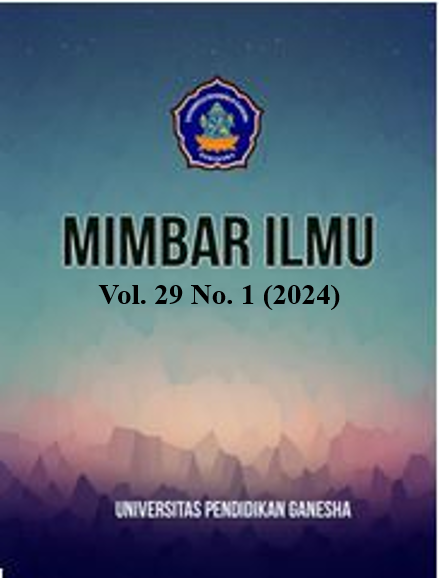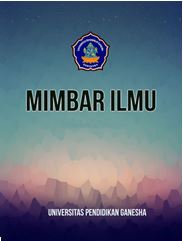Digital Literacy Among Elementary School Teachers: Age and Year of Service Perspective Review
DOI:
https://doi.org/10.23887/mi.v29i1.58304Keywords:
Digital Literacy Skills, ICT Literacy, Media Literacy, Technology Literacy, Information LiteracyAbstract
The government's policy on increasing teachers in the aspect of mastery of technology is a requirement that must be met, this is intended so that the learning process can be carried out more effectively and efficiently by utilizing technology. This study aims to analyze and measure the digital literacy skills of elementary school teachers. This type of research uses a quantitative descriptive method. The subjects of this study were 73 elementary school teachers, who were taken using the quota sampling technique. The data collection technique that the researchers used was a questionnaire to determine the digital literacy abilities of elementary school teachers. The data that has been collected was analyzed using descriptive statistical analysis. The results showed that the literacy skills of elementary school teachers throughout Tanah Datar regency both in the aspects of media literacy, information literacy, and technology literacy for each review (age and years of service) were in the low category, with an average achievement of 2.41 for the view of teacher age and 2.43 for the view of years of service. So it can be concluded that the digital literacy skills of elementary school teachers in Tanah Datar regency are in the low category, both in terms of age and years of service.
References
Afriliandhi, C., Hidayati, D., & Melawati, A. (2022). Teacher’s Digital Literacy to Improve Quality in Learning. International Journal of Education & Curriculum Application, 5(1), 17–24. https://doi.org/10.31764/ijeca.v5i1.7327.
Ahman, Mujiyanto, J., Bharati, Dwi Anggani Linggarnggeraini, Y., & Faridi, A. (2019). Literasi digital: Dampak dan tantangan dalam pembelajaran bahasa. Seminar Nasional Pascasarjana UNNES, 386–389. https://proceeding.unnes.ac.id/snpasca/article/download/313/342.
Arikunto, S. (2010). Metode peneltian. Jakarta: Rineka Cipta, 173.
Asari, A., Kurniawan, T., & Ansor, S. (2019). Pembelajaran Literasi Digital Bagi Guru , Orang Tua Siswa Dan Pelajar Di Lingkungan Sekolah. Prosiding Seminar Nasional Hasil Pengabdian Kepada Masyarakat, 214–224. http://download.garuda.kemdikbud.go.id/article.php?article=1482234&val=11008&title=kompetensi literasi digital bagi guru dan pelajar di lingkungan sekolah kabupaten malang.
Asari, A., Kurniawan, T., Ansor, S., & Putra, A. B. N. R. (2019). Kompetensi Literasi Digital Bagi Guru dan Pelajar di Lingkungan Sekolah Kabupaten Malang. BIBLIOTIKA: Jurnal Kajian Perpustakaan Dan Informasi, 3(2), 98–104. http://journal2.um.ac.id/index.php/bibliotika/article/view/11592.
Ayhan, B. (2019). Digital Literacy. Journal of Victorian Culture, 24(3), 329–330. https://doi.org/10.1093/jvcult/vcz026.
Ayoe, D., Arryadna, P., & Pratiwi, V. (2022). Pengaruh Literasi Digital , Tingkat Pendapatan Orang Tua , dan E-learning terhadap Hasil Belajar Siswa di Masa Pandemi. Edukatif: Jurnal Ilmu Pendidika, 4(4), 5783–5793. https://edukatif.org/index.php/edukatif/article/view/3337.
Basar, A. M. (2021). Problematika Pembelajaran Jarak Jauh Pada Masa Pandemi Covid-19. Edunesia : Jurnal Ilmiah Pendidikan, 2(1), 208–218. https://doi.org/10.51276/edu.v2i1.112.
Bell, S. (2010). Project-Based Learning for the 21st Century: Skills for the Future. The Clearing House: A Journal of Educational Strategies, Issues and Ideas, 83(2), 39–43. https://doi.org/10.1080/00098650903505415.
Blevins, B. (2018). Teaching Digital Literacy Composing Concepts: Focusing on the Layers of Augmented Reality in an Era of Changing Technology. Computers and Composition, 50, 21–38. https://doi.org/10.1016/j.compcom.2018.07.003.
Çam, E., & Kiyici, M. (2017). Perceptions of Prospective Teachers on Digital Literacy. Malaysian Online Journal of Educational Technology, 5(4). https://drive.google.com/file/d/1UubzdfQ6xK7sZ6x_6au00dmDajf7POOQ/view.
Chairunnisak. (2020). Implementasi Pembelajaran Abad 21 Di Indonesia. Prosiding Seminar Nasional Teknologi Pendidikan Pascasarjana UNIMED, 351–359. https://pubs.ressi.id/index.php/jil/article/view/1350.
Cicha, K., Rutecka, P., Rizun, M., & Strzelecki, A. (2021). Digital and media literacies in the polish education system—pre-and post-covid-19 perspective. Education Sciences, 11(9). https://doi.org/10.3390/educsci11090532.
Creswell, J. W. (2014). Research design: qualitative, quantitative, and mixed methods approaches (4th ed). SAGE Publications.
Dinata, K. B. (2021). Literasi Digital Dalam Pembelajaran Daring. Eksponen, 11(1), 20–27. https://doi.org/10.47637/eksponen.v11i1.368.
Diputra, K. S., Tristiantari, N. K. D., & Jayanta, I. N. L. (2020). Gerakan Literasi Digital Bagi Guru-Guru Sekolah Dasar. JCES (Journal of Character Education Society), 3(1), 118–128. https://doi.org/10.31764/jces.v3i1.1483.
Egeli, S., & Sağdinç, E. (2021). The Necessity and Importance of Digital Literacy in the Covid-19 Process. The Online Journal of New Horizons in Education, 11(4), 259–262. https://www.tojsat.net/journals/tojned/articles/v11i04/v11i04-16.pdf.
Han, F., Ellis, R. A., & Pardo, A. (2022). The Descriptive Features and Quantitative Aspects of Students Observed Online Learning: How Are They Related to Self-Reported Perceptions and Learning Outcomes. IEEE Transactions on Learning Technologies, May. https://doi.org/10.1109/TLT.2022.3153001.
Irhandayaningsih, A. (2020). Pengukuran Literasi Digital Pada Peserta Pembelajaran Daring Di Masa Pandemi Covid-19. Anuva, 4(2), 231–240. https://demo.dspacedirect.org/bitstream/handle/10673/1975/8073-25123-1-SM.pdf?sequence=1&isAllowed=y.
Iskandar, I., Sumarni, S., Dewanti, R., & Asnur, M. N. A. (2022). Infusing Digital Literacy in Authentic Academic Digital Practices of English Language Teaching at Universities. International Journal of Language Education, 6(1), 75–90. https://doi.org/10.26858/ijole.v6i1.31574.
Kholid. (2020). Pentingnya Literasi Digital bagi Guru Pada Lembaga Pendidikan Tingkat Dasar dan Implikasinya Terhadap Penyelenggaraan Kegiatan Belajar Mengajar. Jurnal Horizon Pendagogia, 1(1), 3. https://jurnal.untirta.ac.id/index.php/jhp/article/view/10422.
Kuncoro, K. S., Sukiyanto, Irfan, M., Amalia, A. F., Pusporini, W., Wijayanti, A., & Widodo, S. A. (2022). Peningkatan Literasi Digital Guru Guna Mengatasi Permasalahan Pembelajaran di Era Pandemi Covid-19. Abdi Wiralodra : Jurnal Pengabdian Kepada Masyarakat, 4(1), 17–34. https://doi.org/10.31943/abdi.v4i1.50.
Kurniati, G., Egilistiani, R., Wahyuni, Y., & Tisnawijaya, C. (2021). Pengayaan Literasi Digital di MI Jam’iyyatul Khair: Edpuzzle sebagai Media Alternatif dalam Pembelajaran Daring. Acitya Bhakti, 1(2), 116–124. https://www.academia.edu/download/85378345/7443.pdf.
Kusumaningrum, H., & Hafida, S. H. N. (2021). Analisis Literasi Digital terhadap Karakter Jujur Siswa selama Pembelajaran Daring. Pedagogia Jurnal Ilmu Pendidikan, 19(01), 229–238. https://doi.org/10.17509/pdgia.v19i1.32433.
Mardiana, S., Annisarizki, Marthalena, Liza Diniarizky Putri, & Sigit Surahman. (2022). Literasi Digital dalam Upaya Mendukung Pembelajaran Online pada Siswa Sekolah Dasar di Kota Cilegon. Kaibon Abhinaya : Jurnal Pengabdian Masyarakat, 4(1), 47–54. https://doi.org/10.30656/ka.v4i1.3809.
Maxwell, L. (2020). Digital Literacy and Digital Legacy. Library Technology Reports, 56(5), 7–11. https://journals.ala.org/index.php/ltr/article/view/7384.
Nahdi, D. S., & Jatisunda, M. G. (2020). Analisis Literasi Digital Calon Guru SD Dalam Pembelajaran Berbasis Virtual Classroom di Masa Pandemi Covid-19. Jurnal Cakrawala Pendas, 6(2), 116–123. https://doi.org/http://dx.doi.org/10.31949/jcp.v6i1.2133.
Nascimbeni, F. (2018). Rethinking Digital Literacy for Teachers in Open and Participatory Societies. International Journal of Digital Literacy and Digital Competence, 9(3), 1–11. https://doi.org/10.4018/ijdldc.2018070101.
Onyema, E. M., Sen, S., & Alsayed, A. O. (2020). Impact of Coronavirus Pandemic on Education Impact of Coronavirus Pandemic on Education. May. https://doi.org/10.7176/JEP/11-13-12.
Phuapan, P., Viriyavejakul, C., & Pimdee, P. (2015). Elements of digital literacy skill: A conceptual analysis. Asian International Journal of Social Sciences, 15(4), 88–99. https://doi.org/10.29139/aijss.20150406.
Pratolo, B. W., & Solikhati, H. A. (2020). Investigating teachers’ attitude toward digital literacy in EFL classroom. Journal of Education and Learning (EduLearn), 15(1), 97–103. https://doi.org/10.11591/edulearn.v15i1.15747.
Saputri, D. Y., Rukayah, R., & Indriayu, M. (2018). Need Assessment of Interactive Multimedia Based on Game in Elementary School: A Challenge into Learning in 21st Century. International Journal of Educational Research Review, 3(3), 1–8. https://doi.org/10.24331/ijere.411329.
Schunk, D. H., & DiBenedetto, M. K. (2020). Motivation and social cognitive theory. Contemporary Educational Psychology, 60, 101832. https://doi.org/10.4103/0019-5154.182410.
Setyawati, R., Ekadewi, D., & Hapsari, M. I. (2021). Peran Literasi Digital. 360–365.
Spires, H. A., Medlock Paul, C., & Kerkhoff, S. N. (2018). Digital Literacy for the 21st Century. In M. Khosrow-Pour (Ed.), Encyclopedia of Information Science and Technology, Fourth Edition (pp. 2235–2242). IGI Global. https://doi.org/10.4018/978-1-5225-7659-4.ch002.
Suchyadi, Y., Sundari, F. S., & Alfiani, R. (2021). Analisis Literasi Digital Calon Guru Sd Dalam Pembelajaran Berbasis Virtual Classroom. Jurnal Pendidikan Dan Pengajaran Guru Sekolah Dasar (JPPGuseda), 04, 48–53. https://doi.org/10.55215/jppguseda.v4i1.3191.
Sudyana, D. K., & Surawati, N. M. (2021). Analisis Penerapan Literasi Digital dalam Menciptakan Kemandirian Belajar Siswa Hindu di Masa Pandemi Covid 19. Widyanatya, 3(1), 1–5. https://doi.org/10.32795/widyanatya.v3i1.1674.
Sugiyono. (2018). Metode Penelitian Kuantitatif, Kualitatif, dan R&D. Alfabeta.
Sumiati, E., & Wijonarko, W. (2020). Manfaat Literasi Digital Bagi Masyarakat dan Sektor Pendidikan pada Saat Pandemi Covid-19. Buletin Perpustakaan, 65–80. https://journal.uii.ac.id/Buletin-Perpustakaan/article/view/17799.
Sunarmintyastuti, H., Arie, P., Pujaning, A., & Widiyarto, S. (2022). Peran Literasi Digital dalam Pembelajaran Daring Selama Pandemi Covid-19. Jurnal Ilmiah Wahana Pendidikan, 8(6), 32–36. https://doi.org/10.5281/zenodo.6420786.
Sut, H. M., & Oznacar, B. (2017). Effects of COVID-19 period on educational systems and institutions. International Journal of Curriculum and Instruction, 13(1), 537–551. https://ijci.globets.org/index.php/IJCI/article/view/554.
Themes, K. E. Y. T. O. (2013). Literacy across the Curriculum. Literacy across the Curriculum. https://doi.org/10.18848/978-1-61229-143-7/cgp.
Tomczyk, L., & Fedeli, L. (2021). Digital Literacy among Teachers – Mapping Theoretical Frameworks: TPACK, DigCompEdu, UNESCO, NETS-T, DigiLit Leicester. Proceedings of the 38th International Business Information Management Association (IBIMA), 244–252. https://www.academia.edu/download/75737490/Digital_literacy_frameworks.pdf.
Winarno, A., Fedin, M. Y. A., & Salleh, N. H. M. (2022). the Effect of Technological Literacy, Learning Facility, and Family Environment on Students’ Learning Motivation. Jurnal Pendidikan: Teori, Penelitian, Dan Pengembangan, 7(7), 246. https://doi.org/10.17977/jptpp.v7i7.15404.
Downloads
Published
How to Cite
Issue
Section
License
Copyright (c) 2023 Muhammad, Safrizal Safrizal, Resti Yulia

This work is licensed under a Creative Commons Attribution-ShareAlike 4.0 International License.
This work is licensed under a Creative Commons Attribution-ShareAlike 4.0 International License.
Authors who publish with this journal agree to the following terms:
- Authors retain copyright and grant the journal right of first publication with the work simultaneously licensed under a Creative Commons Attribution License that allows others to share the work with an acknowledgment of the work's authorship and initial publication in this journal.
- Authors are able to enter into separate, additional contractual arrangements for the non-exclusive distribution of the journal's published version of the work (e.g., post it to an institutional repository or publish it in a book), with an acknowledgment of its initial publication in this journal.
- Authors are permitted and encouraged to post their work online (e.g., in institutional repositories or on their website) prior to and during the submission process, as it can lead to productive exchanges, as well as earlier and greater citation of published work.








